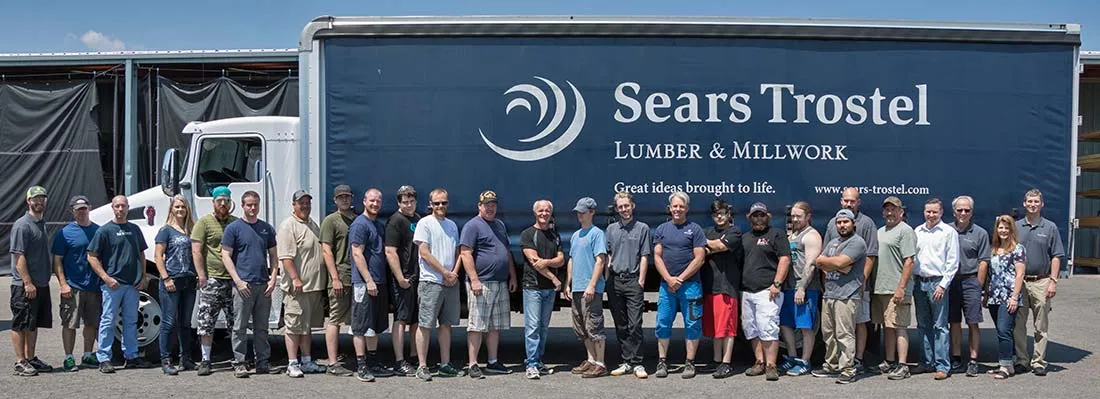Table of Contents
A Special Series from North American Wholesale Lumber Association
As an undergraduate, the term “lumber trader” wasn’t even in my vocabulary. Years later, I still had never heard of this occupation…nor would I have ever guessed that it would eventually follow my name on a business card. But, as often happens with wood products, the industry “picked” me. Of course, I didn’t know it at the time.
Building the Foundation
I entered Virginia Tech with the full intention to study architecture, and by today my 30-year-old self was supposed to have a stack of blueprints to my credit. Two years in, I found myself enjoying classes outside of my architecture studio much more than my major’s coursework. My professor encouraged me to explore geography and geospatial analysis as a major instead. After switching majors, I thought my first job out of college would be as a GIS analyst, but a different opportunity presented itself.
Instead, for my first job out of school, I worked as a fiber supply associate for International Paper in Savannah, Ga. Ironically, because of its parallels with timber, this position offered me a glimpse of the lumber industry and how it operates. Much of my job involved wood procurement and meeting with timber brokers and forming relationships with them, which I did under the tutelage of my mentor, Dean. With Dean riding shotgun, we would head out to small, rural towns to have lunch with various brokers. It was during these times that he taught me how important relationships are in the business. He showed me the importance of knowing who you’re doing business with beyond the superficial level, of really getting to know these folks, and of being your genuine self with them—rules of thumb that I now know also apply to the lumber trade.
I learned a lot at International Paper; but after about a year and a half, I moved up to Richmond, Va., to be near my now-husband. I signed on with a homebuilder, once again finding myself on the fringes of the lumber industry. I learned many practical skills during my time as a project manager for that company, but found myself looking for something with more autonomy. It was actually my husband who spotted an Indeed.com post for a lumber trader and brought it to my attention. Although I didn’t know what the position entailed, the information in the ad piqued my attention. I reached out, and a month later Richmond International Forest Products hired me.
Building Awareness
I’ve now been with Richmond International for five years. What I discovered is that while the wood products industry may not have the initial glossy allure of the Googles and Amazons of the world, it does offer many of the advantages that attract people to employers like these, such as the very laid-back atmosphere. It’s not stuffy and boring; to the contrary, it’s fast-paced and each day presents you with a different challenge. Everything is based on your reputation, your word, and your relationships with people; and that’s something I really love about this industry! Lumber has all these great facets to it, but the problem was that I didn’t know the industry even existed.
Now that I do, I’m making it my mission to spread the word! On the broader level, I am a member of NAWLA’s Education Committee. At the company level, I worked with Richmond International to roll out the “A Day in the Life” pilot program. So often, we set up shop at career fairs but struggle to tell students what it is we actually do. Because it’s something that isn’t easily conveyed through conversation, I pitched the idea of showing young people instead of telling them. In January of this year, just before the spring semester started, we had six Virginia Tech students and a couple of faculty members come and spend the day with us.
In addition to some classroom time, students were paired up with lumber traders and allowed to “shadow” them. They got to ask questions, listen in on phone calls with customers and mills that we have relationships with, and really get a feel for what we do. It’s purely a learning opportunity, with no commitment on the part of the company or the visitors.
The hope is simply that these students enjoy the experience so much that it sparks their interest in a career in the industry. Even if it’s not for them, they might share the encounter with someone who might be a better fit. The overall feedback was wonderful and, depending on how the COVID-19 pandemic continues to unfold, we’re interested in continuing the project with Virginia Tech and potentially other universities at some point in the future.
In addition to capturing student interest in the lumber industry, I’m excited to see a growing female presence in this sector. Many women would be a great fit for this industry, especially those with strong interpersonal skills and the innate ability to cultivate authentic partnerships that can drive a company forward. Building awareness that women have a place in this industry is key, and growing our female support system will only attract more women to it. How to reach more women, particularly younger generations, and encourage them to give the lumber industry a try is one topic that we at Richmond International hope to address through our RIFP Women’s Forum. My mentor at the company—Linda Hull, who was the only female trader until I arrived—came up with idea to host a women’s leadership forum, but was just waiting for someone to help her pioneer it. We now have three years under our belt with this program.
Every February, we invite other women in the industry to a progressive leadership workshop for a day of discussion and self-reflection centered on personal and professional goals. At our next forum, we’d like to invite female college students so that they can explore the industry and get answers to questions about what the occupation entails, what it’s like being a female in a male-dominated workplace, and all that the lumber industry has to offer.
Building for the Future
These have become my passion projects as I look forward to growing in and with this industry over the coming years. My attention will be needed elsewhere in the near term as my husband and I prepare to welcome our first child this summer, but I’m looking forward to returning as a working mother. I see something special in this industry. And if I can play a part in diversifying its workforce and educating others about the appeal of this sector in the meantime, I’d consider that a win.









